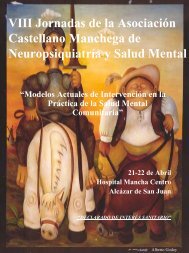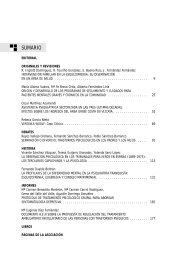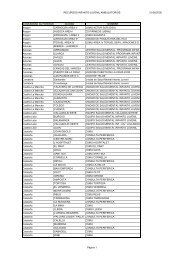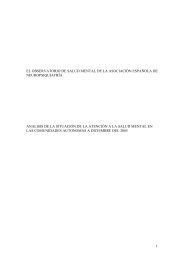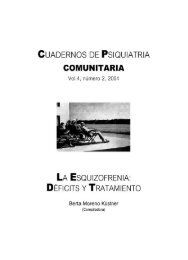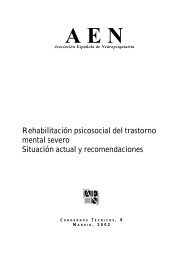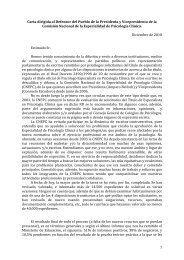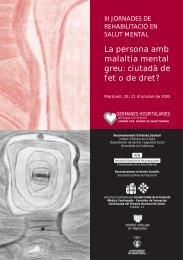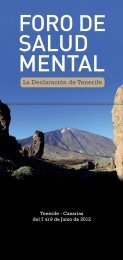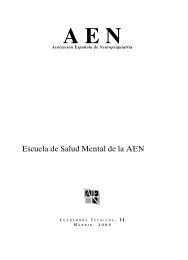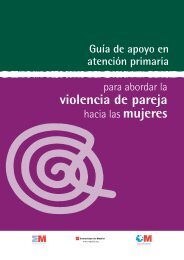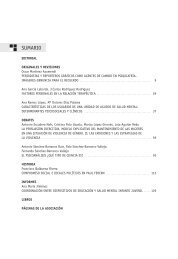Vol 3. Nº 1. 2003 - Asociación Española de Neuropsiquiatría
Vol 3. Nº 1. 2003 - Asociación Española de Neuropsiquiatría
Vol 3. Nº 1. 2003 - Asociación Española de Neuropsiquiatría
You also want an ePaper? Increase the reach of your titles
YUMPU automatically turns print PDFs into web optimized ePapers that Google loves.
Cuad. Psiquiatr. Comunitaria,<strong>Vol</strong>.3, N.º 1, pp. 40 - 57, <strong>2003</strong>Antropo-lógicas <strong>de</strong> la MedicinaFamiliar y ComunitariaJosé Mª UribeArea <strong>de</strong> Antropología Social.Universidad Pública <strong>de</strong> NavarraRESUMENABSTRACTLa introducción <strong>de</strong> la asistencia primaria <strong>de</strong>salud supone un cambio antropológico en el antiguodiscurso médico-enfermo.La enfermedad es <strong>de</strong>finida en el nuevo enfoquecono la gestión <strong>de</strong> <strong>de</strong>terminadas situaciones <strong>de</strong> normalidadcientífica (para el médico en la emfermedad-quejaaducida por el usuario) y <strong>de</strong> respuestapor parte <strong>de</strong> los usuarios (en la enfermedad diagnosticadapor el médico). Así lo que el centro <strong>de</strong>salud propone es una orientación en la "conducta<strong>de</strong> enfermedad" sobre la que se impone una conducta<strong>de</strong> curar o lo que es lo mismo "enfermeda<strong>de</strong>sque entien<strong>de</strong>, colectivas, científicas frente a enfermeda<strong>de</strong>sque atien<strong>de</strong>, individuales, subjetivas, funcionales.El médico <strong>de</strong> familia engloba así el discursomédico y el discurso <strong>de</strong>l enfermo en un concepto <strong>de</strong>salud global sustituyendo el mo<strong>de</strong>lo medicalista <strong>de</strong>enfermar por el mo<strong>de</strong>lo sanitario <strong>de</strong> salud, abandonandola dicotomía organismo natural frente a pensamientocultural.Palabras clave: Discurso médico-enfermo; patronesculturales; conductas <strong>de</strong> enfermedad, <strong>de</strong>curar; mo<strong>de</strong>lo <strong>de</strong> salud.The introduction of primary health care involvesan anthropological change to the traditional doctorpatientdiscourse. Both systems embody specificcultural patterns. The GP unifies these patterns intoa single global health concept, thereby casting asi<strong>de</strong>the dichotomy of the natural organism versus culturalthought - the organism can be moul<strong>de</strong>d and alteredby society.Health Centres propose an orientation towards"illness conduct" to which "curing conduct" is appliedafter the doctor has <strong>de</strong>veloped a taxonomy or illnessrating. Thus the i<strong>de</strong>a of illness (much of which is dueto social influence) is envisaged differently by thehealth centre and by its patients. In other words,there are illnesses which are "ten<strong>de</strong>d" (individual,subjective and functional ones, for example) and illnesseswhich are "comprehen<strong>de</strong>d", such as collectiveand scientific ones.Illness, therefore, is simply the management ofspecific, scientifically normal situations or a logicalresponse on the part of patients (normal for the doctorwhen <strong>de</strong>aling with the illness put forward by the patientand normal for the patient when <strong>de</strong>aling with thedoctor's diagnosis). Such situations can be regar<strong>de</strong>das expressions of health, providing the right scientificbalance between the person, the group and the environment,all ma<strong>de</strong> to fit the patient.In this way the GP absorbs the substitution of thedoctor-treating-illness mo<strong>de</strong>l in favour of the healthmo<strong>de</strong>l.Key words: doctor-patient discourse; culturalpatterns; illness conduct; curing conduct , healthmo<strong>de</strong>l.




